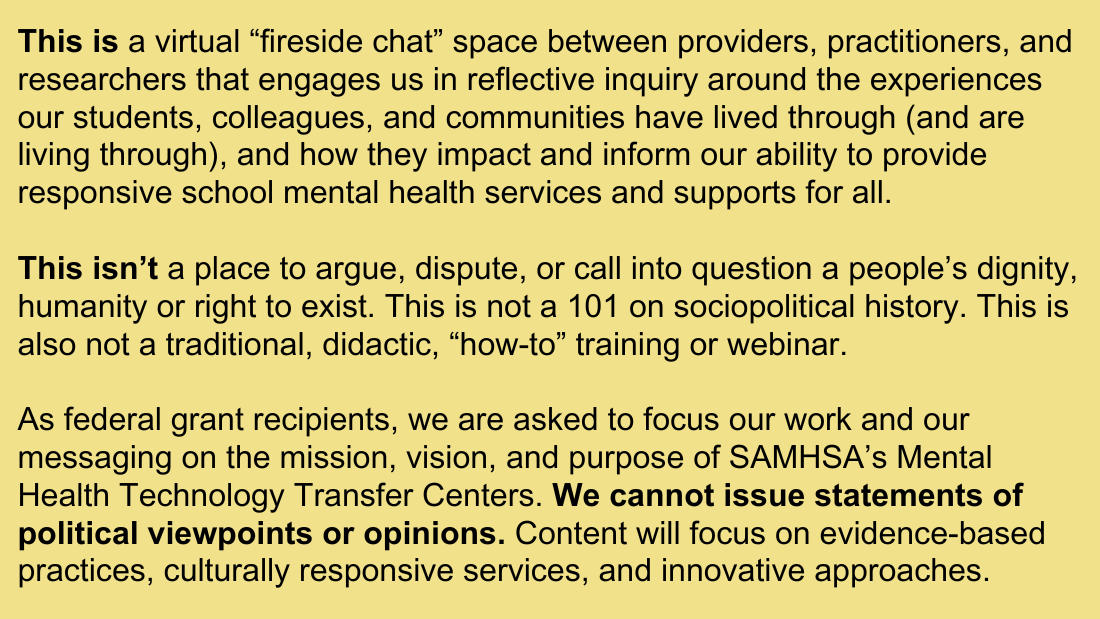Home > Healing School Communities in the Context of Faith-Based Bullying
How might examining faith-based bullying - both against students and staff - necessitate conversations that can translate to policies that steward belonging for all? How might we center anti-Muslim and anti-Jewish experiences in our commitment to prevent, intervene and unpack bullying in our school communities?
Join the Mental Health Technology Transfer Center’s School Mental Health Initiative this summer for a special two-part conversation series, Healing School Communities in the Context of Faith-Based Bullying, exploring bullying & belonging with attention to faith-based experiences of stigma, contention, conflict and policies and programs that foster religious literacy, thereby enhancing school culture and climate. The series is intended for students, families, educators and school mental health professionals who are navigating the ongoing impact of faith-based bullying on student and staff mental health.
On July 23rd & 25th, 2024, we come together to examine recent data (quantitative and qualitative) that can help us drive school mental health leadership, policies, and programs that foster safety for students and staff, specifically those who are experiencing high levels of xenophobia, exclusion, scapegoating, and more. Please note that these sessions focus specifically on anti-Muslim and anti-Jewish bias/hate; while the violence on October 7, 2023 and subsequent violent aftermath has contributed to the rise, both populations have been experiencing an uptick beforehand (see Learning for Justice’s 2019 Hate At School Report). Unpacking anti-Muslim and anti-Jewish hate and bias as school mental health leaders requires us to approach conversations, programs, and policies in an intersectional manner (across racial and ethnic identities), courageously (confronting our own beliefs, fears, misunderstandings, xenophobias), and thoughtfully (not all Muslims are Arab, not all Jews are white, etc). Experiences of bias, bigotry, and bullying against staff and students threaten belonging and are individual, communal, and systemic issues.
We ask our panelists to hold these questions (and more!):
We explore these questions in two sessions through two lenses: What do we know and how might we grow? Each 1.5 hour learning session features a moderator who will engage advocates, leaders and the school mental health workforce in a conversation that focuses on:
Note: These conversations focus on K-12 school environments; while higher education spheres are not the focus, there will inevitably be transferable ideas, suggestions, and takeaways.
Certificates of completion will be made available to viewers of 50% (45 minutes) or more of each live learning session. CEUs are not available for these sessions. If you do not receive a certificate of completion by August 9, please email Ricardo Canelo at [email protected].

Panelists and moderators will be announced soon!
Educator Resources to Address Antisemitism in Public Schools | San Diego County Office of Education
Expelling Islamophobia | Learning for Justice
Health Effects of Antisemitism
How schools are addressing antisemitism and Islamophobia | K-12 Dive
Protecting Student Mental Health in the Face of Antisemitism and Islamophobia | The Jed Foundation
Spotlight On: Jewish Americans' Mental Health
Talking to Children about Hate Crimes and Anti-Semitism
The Devastating Mental Health Effects of Islamophobia | TIME
The Impact of Islamophobia on Muslim Students: A Systematic Review of the Literature
Understanding and Countering Antisemitism and Islamophobia In Schools
Supporting Students, Staff, Families, and Communities Impacted by Anti-Muslim Hate